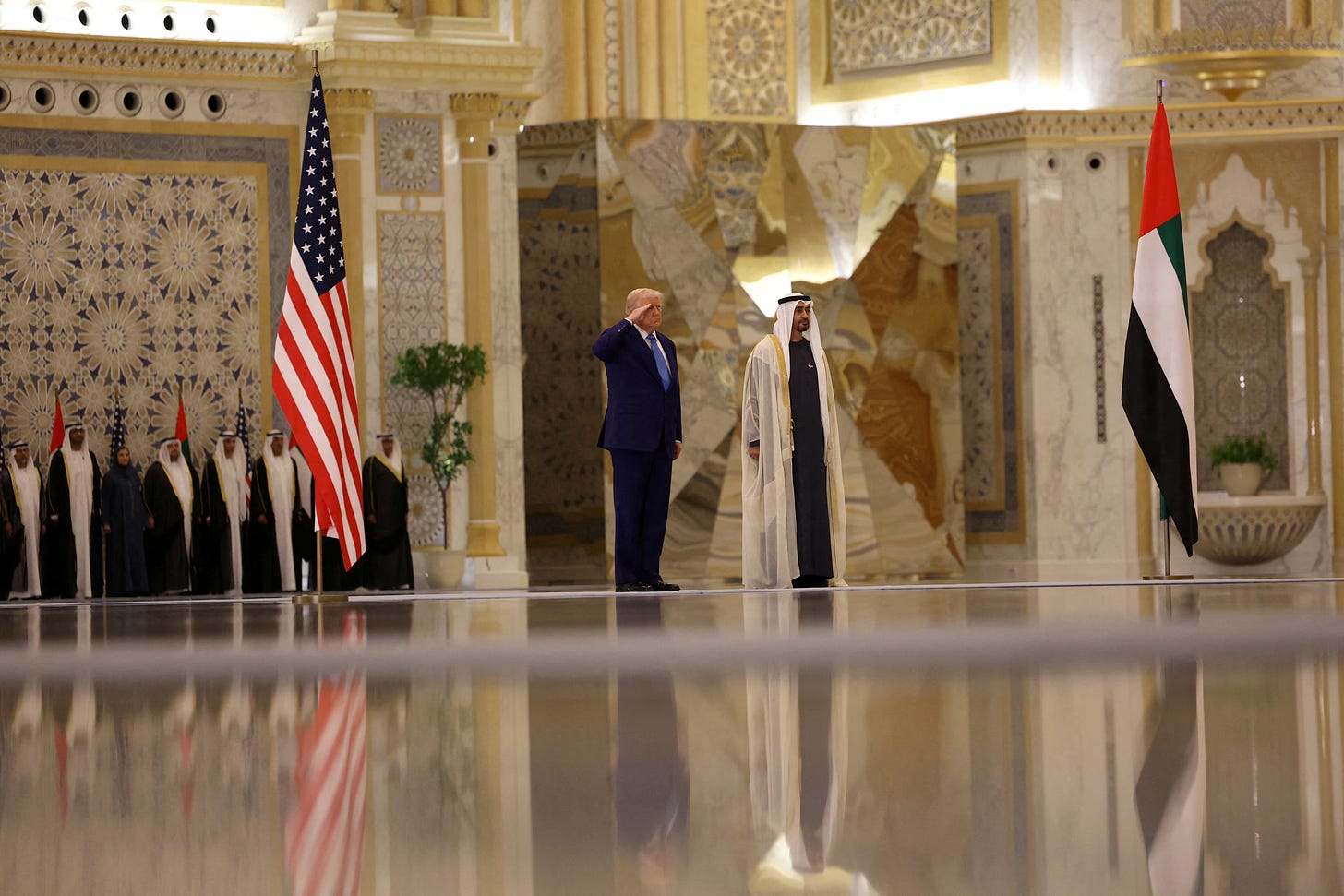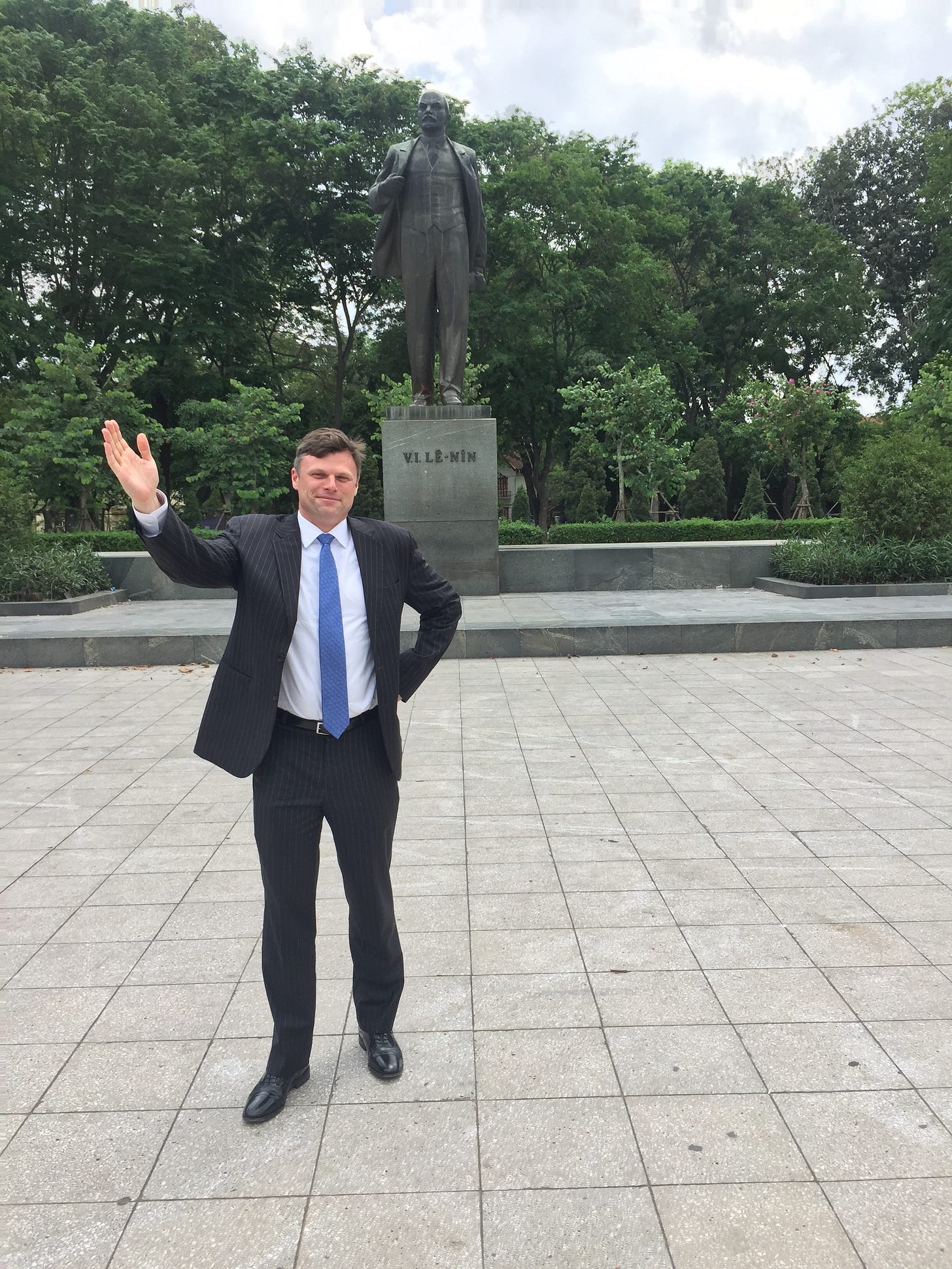Trump Just Created the New G4
USA can "quiet quit" NATO and G7, downgrade other pointless hootenannies.
President Donald Trump returned to the United States triumphant after one of the most consequential presidential trips in history.
In visits to the United Arab Emirates, Saudi Arabia, and Qatar, Trump bagged agreements to invest $1.4 trillion, $600 billion, and $500 billion respectively. They total $2.5 trillion—just under 10 percent of American annual economic output—on a single trip to countries with a combined population of fewer than 50 million people.
But the benefits are even greater and will be more long lived than the dazzling booty. Trump has in effect recognized and sanctified a new economic-political order in the world. The countries he visited combined with the United States could comprise a new de facto “G4” of nations that is far more consequential than the existing G7. Add Japan and India to that G4, and Trump would have a grouping of heavyweight nations in the free world that can actually get things done.
That was the original vision of the G7, which emerged after the economic chaos of the early 1970s and collapse of the Bretton Woods monetary system that had prevailed since the end of World War II. The idea was to collect leaders with power and money to do things, which at that time comprised those who ran the relatively wealthy democracies of Western Europe plus the United States, Japan, and Canada. While G7 summits later experienced mission creep and became unwieldy, politically correct, and pointless, they had the benefit of allowing leaders of the wealthy, free nations to form personal relationships that can be crucial in a crisis.
Today, it is increasingly hard to say that the G7 membership is relevant, except for the United States and Japan. Other members include such economic and political dynamos as Canada and Italy. Would you call them up in an economic or political crisis?
Even G7 countries with larger economies are decreasingly relevant. Germany is in a state of long-term economic and political crisis and decline. Nine years after Brexit, Britain is still deciding whether to be its true self or a postmodern refugee camp. One hoped that peak nonsense occurred when then-British Prime Minister Boris Johnson hosted the G7 in 2021 amid pandemic recovery and declared a “huge opportunity” to build a “greener” and “more gender neutral and perhaps a more feminine” future. Yet the nonsense keeps rolling in, with U.S. Vice President JD Vance having to rebuke British authorities arresting people for silent prayer.
Then there are the French. The less said about them the better.
Europe isn’t just bad for itself, it is a liability for the United States. London and Paris in particular excel at dragging Washington into wars with few vital U.S. interests like those in Libya (2011- ) and Ukraine (2022- ). Europe has talked a big game about getting serious about defense and reform. Yet Germany promised a $107 billion surge in defense spending in 2022 that never materialized. It just vowed an even bigger $544 billion increase that faces similarly dim prospects of success. Meanwhile Berlin recently channeled its Nazi past and was poised to have its intelligence bureaucracy ban the country’s most popular political party before the Trump administration quietly interceded on behalf of democracy. But there should be no doubt that Europe will fail at not sucking. It is a continent for vacations and fond memories of a bygone time—not one where the future will be shaped.
Contrast this sad situation to the one that greeted Trump in the Arabian Gulf. The UAE and Saudi Arabia are particularly rich, with national debt debt hovering at only 30 percent of annual economic output (GDP). Both states have massive assets in the form of sovereign wealth funds and have methodically invested in more oil and gas-production capacity while the rest of the world’s poohbahs were attempting economic suicide with green energy fantasies. Millions of men, especially from South Asia, emigrate to the Gulf for work.
Given that America’s national debt is out of control and must now be refinanced at higher interest rates, having closer ties to these wealthy governments is increasingly important.
The countries also demonstrate that governments can be part of the free world and not be democracies. All three of the nations Trump visited are nearly absolute monarchies, although the UAE in particular has features of accountable government and a partial balance of power among its federation of seven emirates. As one Arab diplomat put it to me: people elsewhere don’t believe our leaders are popular, but they are. Governments that are accountable to their people and friendly to the United States come in a variety of forms.
In remarks in Saudi Arabia, Trump drove perhaps the final nail into the coffin of U.S.-led nation-building, postmodernity, and globalism:
This great transformation has not come from Western interventionists… giving you lectures on how to live or how to govern your own affairs. No, the gleaming marvels of Riyadh and Abu Dhabi were not created by the so-called ‘nation-builders,’ ‘neo-cons,’ or ‘liberal non-profits,’ like those who spent trillions failing to develop Kabul and Baghdad, so many other cities. Instead, the birth of a modern Middle East has been brought about by the people of the region themselves… developing your own sovereign countries, pursuing your own unique visions, and charting your own destinies.
The statement was self-evident but still marks a turning point and comes as a relief. As someone who supported then-President George W. Bush’s freedom agenda after 9/11 from inside and outside of his administration, I still think it made sense to hope and believe that places like Iraq and Syria could govern themselves in effectively secular democracies after the collapse of Ba’athist dictatorships—and that those new governments could be friendlier toward the United States and not generate support for terrorism or its upstream ideology of political Islam. I still believe it pertaining to Iran and its hated clerical regime.
But beginning with the collapse of Iraq into insurgency peaking in 2006 and the failure of Arab Spring in 2010, and combined with the increasingly evident fecklessness, expense, and tyranny of the U.S. national security apparatus, most Americans grasped the reality that Trump finally made official U.S. policy in Riyadh. It was the most significant presidential statement on how the United States will relate to other governments since then-President Ronald Reagan’s Westminster Speech in 1982.
Crucially, it was a complete reversal of Joe Biden’s foreign policy whose three most prominent features were putting Europe first, seeking to isolate Saudi Arabia for a human rights violation, and empowering Iran and the world’s other great human rights abusers and exporters of terrorism. U.S. voters rejected that approach amid higher gas prices, Iranian proxies killing Americans, wasted effort in irrelevant Ukraine, and national humiliation in Afghanistan.
Trump is now free to engage in quiet quitting—the phenomenon that emerged during the pandemic of people who don’t formally leave an organization but cease doing real work. He should do so with obsolete organizations like the G7, NATO, and the United Nations. Trump has repeatedly given each entity a chance to reform and be relevant. Each has proven incapable of reform or relevance to rest of the 2020s. Pointless confabs like the Asia-Pacific Economic Dialogue and the G20 should also face downgrade. The United States need not leave them in a huff, especially as the new order of finance, diplomacy, and trade that Trump is orchestrating has yet to take clear form. But he should deepen the quiet quitting of them, devote less time and effort to them, and send lower-level officials to attend in his place, while focusing on new groupings like his de facto G4+.
What will the world and its power structures look like a decade from now? No one really knows. Trump is attempting to steer the United States through major transitions including a shift in power from Europe to the Middle East and the Pacific. The flow of trade and wealth will change dramatically. Trump is walking a narrow political path at home to ignite private sector growth by extending tax cuts and managing massive debt he inherited. He is opposed by an imbecile Keynesian at the Federal Reserve, Jerome Powell, whom Trump unfortunately has hesitated to fire. Elsewhere on the national power ledger, it is unclear if a U.S. military led by a newsreader who resembles an over-promoted Swiss male prostitute can learn radical lessons from the Ukraine War and be transformed from an expensive albatross into a force that can deter war with China.
But Trump has done what no one else in the world could do, including his predecessors. He has begun to craft a world order in which the United States has a serious chance at remaining dominant.
Flashback
The Supreme Court on Thursday heard arguments over Trump’s executive order purporting to limit citizenship of people born here—an obvious violation of the 14th Amendment and its simple guarantee of citizenship, which also prevents the political disaster of multi-generational stateless non-citizens (see Gaza and decide if you want that here). While there was useful debate among the justices about limiting the power of activist judges to issue nationwide injunctions against the executive brach, none of the justices defended Trump’s attempt to reimagine the Constitution. Unfortunately, some of the more loony fringe of MAGA—every movement has them—has misled Trump and set him up for an epic loss on this issue.
Earlier this year, Mark Simon and I discussed the matter with prominent legal scholar and former Justice Department official John Yoo. Check out the segment.
Parting Shot
According to RT, which is funded by the Russian government, an EU country has warned its citizens how to spot potential infiltrators from Russia. Reportedly, the Latvian intelligence bureaucracy has told its people to be on the lookout for those with “a sloppy, unkempt appearance, and insufficient hygiene.”
But what about suspect individuals who shower and wear suits? How to detect them?










I agree with your POV except for you opinion of Sec Hegseth. Holy smokes! I see that he's doing a great job so far. He has a degree from Princeton and retired as a major from the Army with REAL combat experience. He has broken all military recruiting goals. He'll be great for the US.
Sorry, but Ukraine is VERY RELEVANT, and Trump must redeem his weakness in that area by confronting Putin with an ‘either/or’ choice- concede Ukraine choice to join NAT0 - return Crimea, Luhansk and Donetsk to Ukrainian sovereignty
And get the FUCK OUT OF Ukraine.
Period. Kissing Putin’s ass any longer is lower than whaleshit - and I am being polite here!!!